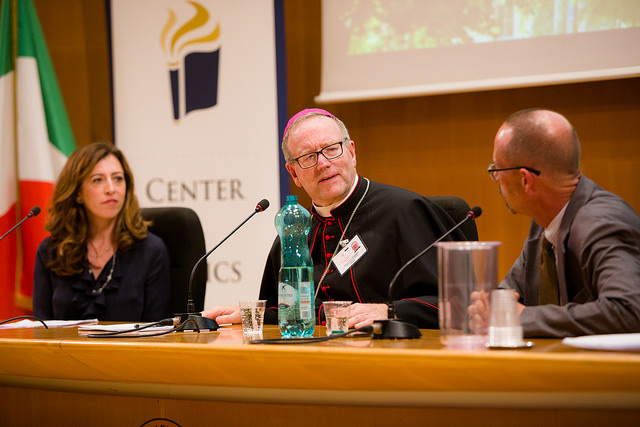“If the Church does not reach us while we are young, someone else will tell us what we should live for,” said Gonzalo Martinez, a young Catholic from Uruguay speaking at a panel discussion in Rome on Oct. 4 as bishops from around the world gathered with Pope Francis for a month-long meeting on young people and the faith. Martinez concluded his reflections by urging the Pope and bishops, “Lead us with Christ at the center, with Mary to petition, and the witness of the saints to follow. Let us walk together in this journey and help each other achieve the holiness we truly desire!”
Martinez, a doctoral student in computer science at the University of Notre Dame, was one of seven panelists invited from around the globe to give personal testimonies about the role of the Church in their spiritual journeys. Also participating and giving reflections alongside the young Catholics were two delegates to the synod, Bishop Godfrey Igwebuike Onah of Nsukka, Nigeria and Auxiliary Bishop Robert Barron of Los Angeles. The panel, entitled “Behold, I Make All Things New: A Conversation on Youth, Faith, and Vocation,” was convened by the Notre Dame Center for Ethics and Culture and hosted by Dr. Pia de Solenni, Chancellor of the Diocese of Orange.
Maryssa Gabriel of Bermuda, a doctoral student at Notre Dame Law School, shared her personal experience of suffering following a difficult break-up and the healing she found at the foot of Christ’s cross. “I understood that Jesus was moved by my suffering and loved me with a human heart,” she said. The synod is a chance for the Church to recommit herself to sharing the gift of hope found in the sacraments, Ms. Gabriel concluded. “We need Churches to be unlocked and open, available to young people so that, through the Sacraments, we can encounter the healing power of Christ, which, for many of us, is the first step towards discerning our unique mission in life.”
Bishop Robert Barron summarized the presentations from the young panelists as reflecting classical transcendental truths, saying, “A lot of you mentioned the true, the good, and the beautiful, and that’s it. God is the true, the good, and the beautiful in their properly unconditioned forms. Some particular form of the good, the true, and the beautiful was a trigger for you, and got [your] restless heart engaged. You guys followed it all the way, to God. And the Church really shouldn’t lose confidence in that.”
Some of the panelists acknowledged their struggles to remain Catholic in the face of scandals that challenge the credibility of the Church. Notre Dame Law School student Aly Cox of Indianapolis, Indiana, spoke about her conviction that the practical application of Catholic social doctrine outweighs any difficulties that scandal may produce. Catholic social teaching “is unique and compelling because of how it understands the infinite and irreplaceable value of the human person — that the person is both body and soul, that the person’s value is not defined by what it ‘produces’ but by the very fact that it is made in the image and likeness of God,” Ms. Cox said. The Church’s social doctrine reflects the idea that, “persons are fundamentally relational and that we flourish together in communities,” especially the community of the Body of Christ.
Wen Yuan, a young Catholic from Beijing, recalled her own conversion at the age of 14 as she was drawn first by the beauty of the Church building and then by a desire to know the person of Jesus. Discovering the communion of the Church to be like a family, Ms. Yuan found herself nourished by the “little way” of St. Therese of Lisieux. “When I feel annoyed or offended, I always ask myself, what would St. Therese do with it? Then, I would remember her heroic battle of charity and self-sacrifice, which encourages me to do the same.” Ms. Yuan concluded her remarks by asking the clergy to always serve as models of holiness. “I encourage our shepherds—our priests and bishops—to help walk with us in our faith journeys. Affirm our desire to be holy by the witness of your lives! Encourage our holiness through your example! Let us grow in holiness—this journey back to the Lord—together!”
Bishop Godfrey Onah, in remarks concluding the formal portion of the event, thanked the young panelists for their reflections. “How I wish more of my fellow bishops in the synod hall would hear the testimony you just gave this evening!” Regarding the wounds caused by scandal and sin, Bishop Onah concluded, “Have you ever asked yourself why Jesus, who rose from the dead, who conquered death, did not remove the wounds from his body? That risen body bears wounds. Unlike biological wounds, that will eventually destroy the organism, the wounds on the body of Christ, the Church, will never destroy the Church. That is my faith.”
Video of the panel discussion can be viewed at bit.ly/oct4rome

